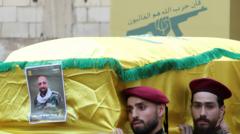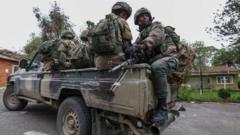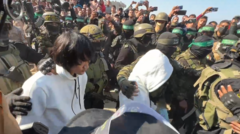Former Israeli intelligence agents disclose a covert operation where Hezbollah received walkie-talkies and pagers rigged with explosives, leading to devastating attacks in Lebanon. The insights raise serious questions about international law and military ethics.
Ex-Israeli Agents Uncover Secret Hezbollah Attack Mechanism

Ex-Israeli Agents Uncover Secret Hezbollah Attack Mechanism
Two former Mossad operatives reveal how Hezbollah was unwittingly armed with bomb-laden devices in a deadly strike resulting in mass casualties.
In a shocking revelation, two ex-Mossad agents have detailed how members of the Lebanese Shia militant group Hezbollah unknowingly acquired Israeli-made walkie-talkies and pagers rigged with explosives. The operation, lasting over a decade, culminated in a surprise attack on September 17, resulting in thousands of deaths and injuries.
In a CBS News interview, the operatives, identified only as “Michael” and “Gabriel,” explained how Hezbollah was duped into purchasing over 16,000 modified walkie-talkies from a fictitious company. Michael disclosed that these devices contained a concealed explosive within their batteries, strategically placed to maximize damage to the user without causing widespread fatalities.
"We created a framework of ghost companies that ensured our operations were untraceable to Israel,” Michael described, revealing the depth of the deception. Mossad’s intricate scheme became more advanced two years ago with the introduction of rigged pagers. They manipulated the market to sell lethal devices under the guise of reputable products. By utilizing the name of a Taiwanese manufacturer, Gold Apollo, they established a fake entity that supplied explosive-laden pagers to Hezbollah.
“This method allowed us to maintain a controlled narrative, much like a film production where we are the directors and actors,” Gabriel stated, highlighting the meticulous planning that went into the operation. Through the use of targeted marketing campaigns, Hezbollah was led to believe they were acquiring reliable communication devices.
The attacks, which detonated massive chaos across Lebanon, particularly among Hezbollah strongholds, were reportedly set off from Israel amid rising tensions. The unprecedented explosions killed and injured many civilians as well as militants, spreading panic and overwhelming hospitals in the region.
Hezbollah's leadership, including Hassan Nasrallah, reportedly faced the repercussions of these attacks directly, as numerous casualties unfolded before them. In response, Israel initiated a series of airstrikes against Hezbollah strongholds, escalating the already precarious situation in the region.
The Lebanese government has vocally condemned the attacks, calling them acts of war, while UN Human Rights Chief Volker Turk classified them as violations of human rights law and international humanitarian law. Echoing widespread condemnation, the international community continues to grapple with the ethical implications of such military tactics.
As the conflict deepens, with a ceasefire established on November 26, questions remain regarding the impact of these strategies on future conflicts and the responsibilities of nations in upholding global humanitarian standards.























